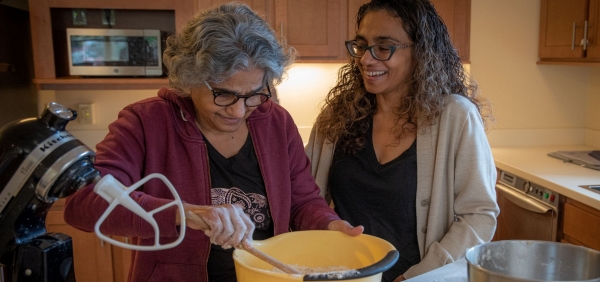Alzheimer’s and Heart Disease Is there a Link?

February is a month for celebrating matters of the heart, and we’re not just talking about Valentine’s Day. It also marks American Heart Month, with its focus on heart health. According to the Centers for Disease Control and Prevention, heart disease is the leading cause of death for men and women of most racial and ethnic groups in the United States. In fact, 1 in 4 Americans, or 659,000 people, die of heart disease each year, more than from all forms of cancer combined.
While it’s not true that heart disease is inevitable with age, it is a fact older adults 65+ are more likely than younger people to develop coronary disease, have a heart attack or suffer a stroke. These are sometimes the result of medical conditions, but the major causes are lifestyle-related: a sedentary lifestyle, stress, poor diet and smoking. For those reasons, heart disease is mostly preventable.
How does Alzheimer’s affect the heart
It may surprise you to learn that Alzheimer’s and cardiovascular disease share common risk factors. A study by the Harvard School of Public Health reported that high blood pressure, high LDL cholesterol, low HDL cholesterol, and especially diabetes, are strongly linked to the incidence of cognitive decline and Alzheimer’s disease. Another study published by Oxford Academic implies an even stronger link between heart disease and dementia. Patients with atrial fibrillation, hypertension or who’d had a heart attack were at a high risk for Alzheimer’s disease and other dementias. And patients with Alzheimer’s and other dementias were at a higher risk of cardiac dysfunction affecting the flexibility of their arteries and blood flow to the heart.
These studies suggest that by controlling health factors such as high blood pressure and cholesterol and adopting health habits to prevent heart disease, we also reduce the risk of developing dementia later in life. Because brain changes related to dementia start a decade or more before symptoms appear, the earlier seniors make even small improvements to cardiovascular health, the more their cognitive health will benefit, years later.
What are dementia risk factors linked to heart disease?
- High blood pressure
- High cholesterol levels
- Alcohol abuse
- Smoking
- Diabetes
- Obesity
- Stress
- Lack of regular medical checkups
Establishing healthy habits
No matter if we’re in our 50s, 60s, or older, committing to a healthy lifestyle can prevent and reduce the risk factors for cardiovascular disease and dementia. It can be challenging to change behaviors, but by teaming up with friends and family members, we can give ourselves the best chance of success. It’s within our power to take control and improve our lifestyle for the better.
Eat heart-healthy foods: Limit red meat and fatty foods, and add more green and colorful vegetables, whole grains, fruits, nuts, and seeds to your diet. Avoid drinking more than two cups of coffee a day.
Give up smoking: Smoking is proven to cause cancer and chronic heart disease. Giving up cigarettes or other nicotine products is highly recommended for a longer, healthier life.
Stay active: Get 30 minutes of light to moderate exercise at least five days a week. Try to include muscle-strengthening exercises at least twice a week.
Reduce stress: Excessive stress takes a toll on physical or mental health. Look for several different ways to destress and do them regularly. Try meditation, yoga, art, music or a club aligned with your interests.
Get good sleep: A good night’s sleep boosts your mood, revs up your metabolism and supports healthy immune function. Aim for between seven to nine hours of uninterrupted shut eye if possible.
Check your BMI: The fatter you are, the more at risk you are. Find out your body mass index (BMI) from your doctor and figure out a way to reduce body fat and bring it into a healthy range.
See your doctor: Schedule regular checkups with your doctor to monitor blood pressure, artery health, and cholesterol levels. If the numbers are high, work with your doctor to lower them.
What this means for caregivers
If you’re caring for someone with Alzheimer’s or another dementia, be sure to care for their heart health as well. Be aware they may develop heart problems due to their disease, but not all heart conditions have easily noticeable symptoms. It’s important to regularly monitor their blood pressure and consult a specialist to check for arterial stiffness and other heart dysfunction. While you’re at it, get your heart health checked out too. Caregivers can be so preoccupied with their loved ones that they neglect their own health so here are some tips to make sure you’re taking good care of yourself too.
Discover Artis Senior Living.
Our Memory Care experts understand the interrelationship between dementia and heart disease. We’re a leader in caring for people with Alzheimer’s and other dementias, with over 27 communities in 11 states. Our innovative Memory Care keeps your loved one safe, respects their interests and inspirations, and allows them the freedom to choose how they spend each day. We’d love to tell you more about The Artis Way. Get in touch with us today by following this link.



